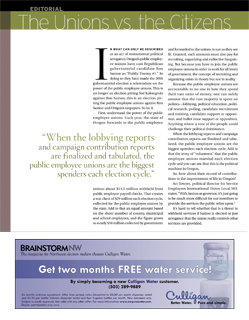The Unions vs. The Citizens
Editorial
In what can only be described as an act of
monumental political arrogance, Oregon’s public employee unions
have cast Republican gubernatorial candidate Ron Saxton as “Public
Enemy #1.” In doing so they have made the 2006 gubernatorial election
a referendum on the power of the public employee unions. This is no longer
an election pitting Ted Kulongoski against Ron Saxton; this is an election
pitting the public employee unions against Ron Saxton and Oregon’s
taxpayers. So be it.

First, understand the power of the public employee unions. Each year,
the state of Oregon forwards to the public employee unions about $14.5
million withheld from public employee payroll checks. That creates a war
chest of $29 million each election cycle, collected for the public employee
unions by the state. Add to that an equal amount based on the sheer number
of county, municipal and school employees, and the figure grows to nearly
$58 million collected by government and forwarded to the unions to use
as they see fit. Granted, such amounts must also pay for recruiting, organizing
and collective bargaining. But because you have to join the public employee
unions in order to work for all levels of government, the concept of recruiting
and organizing exists in theory but not in reality.
Because the public employee unions are accountable to no one in how they
spend their vast sums of money, one can safely assume that the vast majority
is spent on politics—lobbying, political education, political research,
polling, candidate recruitment and training, candidate support or opposition,
and ballot issue support or opposition. Anything where a vote of the people
could challenge their political dominance.
When the lobbying reports and campaign contribution reports are finalized
and tabulated, the public employee unions are the biggest spenders each
election cycle. Add to that the army of “volunteers” that
the public employee unions marshal each election cycle and you can see
that this is the political machine in
Oregon.
So, how about their record of contributions to the improvement of life
in Oregon?
Art Towers, political director for Service Employees International Union
Local 503, states, “With Saxton as governor, it’s just going
to be much more difficult for our members to provide the services the
public relies upon.”
It’s hard to tell whether that is a threat to withhold services
if Saxton is elected or just arrogance that the union really controls
what services are provided.
The public employee unions’ record of achievements is short and
self-centered. They brought us PERS, which allows public employees to
retire at age 55 with a taxpayer-funded pension in excess of what they
were earning while working. The net effect of that is to encourage public
employees to retire early and to force the taxpayers to not only fund
their exorbitant pensions but also to fund the replacement salary of the
person who is hired to do their work.
The PERS problem is so great that it was tagged at $13.5 billion at the
beginning of the 2003 legislative session. Today, state and local government
units are paying an approximate 20 percent surcharge to fund this outrageous
system. It’s hard to forget the picture of the laughing, partying
recent retirees that ran in the state’s largest newspaper.
Oregon’s public education system is in shambles. Salaries, benefits
and work rules are dictated by the ever-vigilant and powerful public employee
unions. Oregon continues to pay more than the national average on a per
capita student basis for K-12 education and far more than neighboring
states such as Washington, Idaho, Utah, Nevada, and Arizona. Yet its academic
performance is mediocre at best, based on national averages. Oregon has
one of the highest drop-out rates in the nation.
The public employee unions are staunch opponents of educational accountability
and teacher merit pay. They are routinely in the vanguard to support higher
taxes in order to increase the amount of money available to an inefficient
educational system. To be sure, the public employee unions have two goals:
increase the number of public employees hired, and increase the pay and
benefits of those employees without limits. As they achieve those goals
they have more money to spend on political dominance. The public employee
unions view government as their open checkbook.
In contrast, Saxton states simply, “My goal isn’t to run
government so the bureaucracy is all happy. My goal is to run it so it
meets the needs of the citizens.”
And what about Kulongoski? He has promised to spend more money and to
veto any attempts to reform the abusive PERS system.
Maybe it’s time to find out whether Oregonians want to run government
for the benefit of the public employee unions or for the benefit of the
citizens.
|